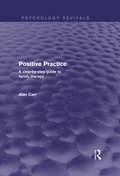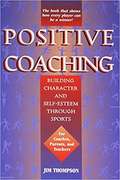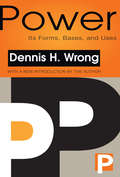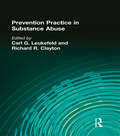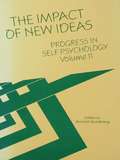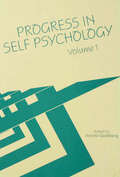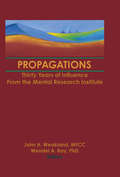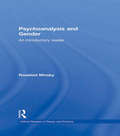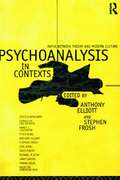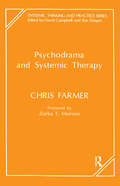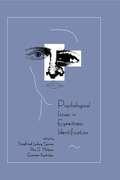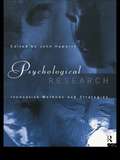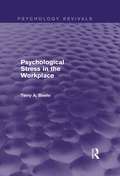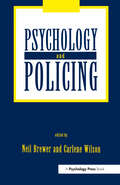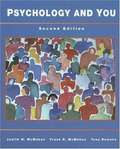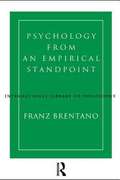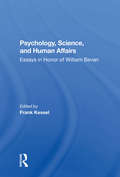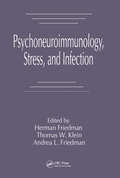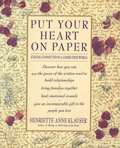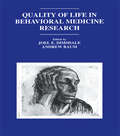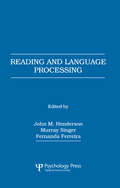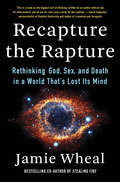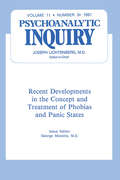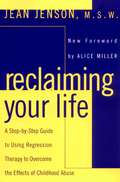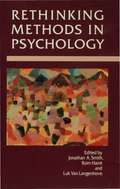- Table View
- List View
Positive Practice: A Step-by-Step Guide to Family Therapy (Psychology Revivals)
by Alan CarrOriginally published in 1995 Positive Practice is for newcomers to the field of family therapy and systemic consultation including professionals from a variety of disciplines, such as psychology, psychiatry, social work, nursing, child care and protection, occupational therapy, paediatrics and general medical practice. Positive Practice is a step-by-step approach to family therapy written both as a treatment manual and as a training resource. It describes in detail a unique approach to consulting to families with youngsters who have psychological or social problems. It covers the difficulties associated with planning the first consultation, strategies for family assessment and problem formulation, methods for developing a therapeutic contract and goal setting, plans for conducting therapy and troubleshooting resistance, and ways of concluding therapy. It includes many diagrams and checklists and is essentially jargon-free. Practical exercises are given at the end of each chapter, making it an ideal training resource for any introductory course. Special issues discussed include adjunctive individual sessions, convening network meetings, jointly managing statutory and therapeutic responsibilities, ethical decision making, clinical audit and professional development. An integrative formulation model provides a focus for both guiding assessment and planning therapy. The approach to practice described in this book offers clinicians a way to integrate new ideas from the burgeoning literature on family therapy, theory and research into their clinical work.
Positve Coaching: Building Character and Self-Esteem Through Sports
by Jim ThompsonPositive Coaching is jam packed with information for coaches in any sport. The book includes over 200 coaching recommendations on specific psychological, motivational, and behavioral situations. There is a special focus on the coach as storyteller -- 50 motivational stories can be used to develop strong communication with athletes.
Power: Its Forms, Bases and Uses (Key Concepts In The Social Sciences Ser.)
by Dennis WrongIn one grand effort, this is an anatomy of power, a history of the ways in which it has been defined, and a study of its forms (force, manipulation, authority, and persuasion), its bases (individual and collective resources, political mobilization), and its uses. The issues that Dennis Wrong addresses range from the philosophical and ethical to the psychological and political. Much of the work is punctuated with careful examples from history. While the author illuminates his discussion with references to Weber, Marx, Freud, Plato, Dostoevsky, Orwell, Hobbes, Arendt, and Machiavelli, he keeps his arguments grounded in contemporary practical issues, such as class conflicts, multi-party politics, and parent-child relationships.In his new introduction, prepared for the 1995 edition of Power, the author reconsiders the concept of power, now locating it in the broader traditions of the social sciences rather than as a series of actions and actors within the sociological tradition. As a result. Wrong emphasizes such major distinctions as "power over" and "power to," and various conflations of power as commonly used. The new opening provides the reader with a deeper appreciation of the non-reductionist character of the book as a whole.
Prevention Practice in Substance Abuse
by Carl G Leukefeld Richard R ClaytonHere is helpful information about joint activities for prevention researchers and practitioners. Prevention Practice in Substance Abuse provides cutting-edge information related to prevention research and practice. Too frequently, researchers and practitioners do not communicate from a basic understanding of concepts and principles. This book begins to fill that void by providing information and recommendations for practitioners and researchers to develop projects jointly so both groups become more effective in their work.Chapters in Prevention Practice in Substance Abuse are grouped into three areas: background chapters contain information related to prevention in the United States, data-based chapters present the most recent national and international evaluation findings, and conceptual chapters stimulate thought about drug abuse prevention. A concluding chapter explores recommendations for joint activities and presents methods for both practice and research to enhance knowledge development. Specific topics addressed by the contributing authors include: mass media campaigns morality and substance abuse Hungarian adolescent drug abuse parenting practices social influences-oriented substance abuse prevention curricula choosing a paradigm to guide research and practicePrevention Practice in Substance Abuse is an ideal guide for drug and alcohol practitioners and researchers who wish to become more effective in their work using strategies for cooperating with each other to combat the use and abuse of drugs and alcohol.
Progress in Self Psychology, V. 11: The Impact of New Ideas (Guilford Psychology Texts Ser.)
by Arnold GoldbergVolume 11 begins with a timely assessment of self psychology and intersubjectivity theory, with original contributions by Carveth, Trop, and Powell, and a critical commentary by P. Ornstein. Clinical studies span the transferences, the complementarity of individual and group therapy, the termination phase, and multiple personality disorder. A special section of "dying and mourning" encompasses women professionals and suicide, the self psychology of the mourning process, and the selfobject function of religious experience with the dying patient. The volume concludes with theoretical and applied studies of personality testing in analysis, writer's block, "The Guilt of the Tragic Man," and the historical significance of self psychology. A testimony to the evolutionary growth of self-psychology, The Impact of New Ideas will be warmly welcomed by readers of the Progress in Self Psychology series.
Progress in Self Psychology, V. 1: The Evolution Of Self Psychology (Guilford Psychology Texts Ser.)
by Arnold GoldbergThe premier volume in the Progress in Self Psychology Series was completed two years after Heinz Kohut's death in 1981. Hence, this volume has a unique status in the history of self psychology: it bears the imprint of Kohut while charting a course of theoretical and clinical growth in the post-Kohut era. Biographical reminiscences about Kohut (Strozier, Miller) and commentaries on Kohut's "The Self-Psychological Approach to Defense and Resistance" [chapter seven of How Does Analysis Cure?] (M. Shane, P. Tolpin, Brandchaft, Oremland) are juxtaposed with a section of self-psychological reassessments of interpretations (Basch, A. and P. Ornstein, Goldberg). Clinical papers cover the selfobject transferences (Hall, Shapiro), patient compliance (Wolfe), and the "self-pity response" (Wilson), while theoretical contributions present ideas of Stolorow, Bacal, White, and Detrick that are foundational to their subsequent writings. This volume helped to shape the theoretical and clinical agenda of self psychology in the decades following Kohut's death.
Propagations: Thirty Years of Influence From the Mental Research Institute
by Terry S TrepperHere is a work of profound clinical scope from some of the foremost leaders in psychology. Propagations: Thirty Years of Influence From the Mental Research Institute, written by alumni and disciples of the Institute (MRI), is not just a compliment to the MRI influence, but also a way for readers to discover and savor the important contributions of those influenced by the MRI. The book contains the cutting edge thinking of some of the most respected clinicians from across the globe. The authors describe their application of ideas pioneered at the MRI, demonstrating its broad influence on present day leaders of family and brief therapy. Chapters range from the theoretical to the case study, tied together by the theme of how this amazing institute has widely impacted therapeutic thought. The book clarifies the depth and power of the MRI influence, which extends to theory, all aspects of psychotherapy practice, other professions, and other lands. Propagations offers outstanding conceptualizations, teaching, writing, and clinical and non-clinical therapy ideas that are immediately useful to clinicians, academic researchers, students, and other individuals interested in how people change.The book’s introduction provides background information on MRI and includes a condensed transcript of a “trialog” which took place between Jules Riskin, Paul Watzlawick, and John Weakland conveying MRI’s origins, traditions, and ethos. Propagations then breaks into four sections. Influencing Fields of Interest and Viewpoints examines MRI influence beyond the specific field of psychotherapy. Influences on Clinical Work looks at MRI’s influence on professional groups and contains clinicians’reflections on how contact with MRI theory and practice has influenced their work. Changes in Venue shows utilization of MRI approaches across cultural and professional borders, while The Outer Reaches looks beyond the specifics of psychotherapy. This inviting book reflects a wide variety of approaches, styles, and subjects, and ranges from preliminary musings to formal reports. This diversity offers a useful example of how new ideas and related practices develop and diversify from a broad common core. Readers can discover how interactional principles are being implemented in different nations, practice settings, and theoretical applications. Family and brief therapists, counselors and counselor educators, and professionals in related fields will find Propagations a source of useful information, thoughtful recollection, and stimulation for future activities.
Psychoanalysis and Gender: An Introductory Reader (Critical Readers in Theory and Practice)
by Rosalind MinskyWhat is object-relations theory and what does it have to do with literary studies? How can Freud's phallocentric theories be applied by feminist critics? In Psychoanalysis and Gender: An Introductory Reader Rosalind Minsky answers these questions and more, offering students a clear, straightforward overview without ever losing them in jargon.In the first section Minsky outlines the fundamentals of the theory, introducing the key thinkers and providing clear commentary. In the second section, the theory is demonstrated by an anthology of seminal essays which includes:* Feminity by Sigmund Freud* Envy and Gratitude by Melanie Klein* An extract from Transitional Objects and Transitional Phenomena by Donald Winnicot* The Meaning of the Phallus by Jacques Lacan* An extract from Women's Time by Julia Kristeva* An extract from Speculum of the Other Woman by Luce Irigaray
Psychoanalysis in Context: Paths between Theory and Modern Culture
by Anthony Elliott Stephen FroshDuring the last decade and a half there have been dramatic changes in psychoanalytic theory, as well as in cultural, social and political theory. Psychoanalysis in Contexts examines these changes and explores the relationship between psychoanalysis and theory. The volume brings together leading scholars and practitioners in psychoanalysis to develop a unique rethinking of the relations between subjectivity and inter-subjectivity, sexual difference and gender power, and unconscious desire and political change. Psychoanalysis in Contexts creates a dialogue between different psychoanalytic approaches to the study of subjectivity, social action and modern societies. It will be essential reading for everyone interested in the future direction of psychoanalytic and cultural theory.
Psychodrama and Systemic Therapy (The Systemic Thinking and Practice Series)
by Chris FarmerIt is now increasingly recognized that psychodrama provides a valid and useful tool in many different contexts; equally, practitioners in a wide variety of fields are acknowledging the benefits that a systems thinking approach can bring to their work. This book unites the two by describing the author's work over a number of years. The author provides a lucid exposition of his own systemic approach to psychodrama, both theoretically and in practical clinical terms. The final section, which discusses systemic approaches to psychiatric care in general, puts the book in a wider context, and will make it of interest to a wide range of mental health professionals.
Psychological Issues in Eyewitness Identification
by Siegfried Ludwig Sporer Roy S. Malpass Guenter KoehnkenWhy do police officers, investigators, prosecutors, judges, and others with an interest in eliciting accurate memory-based testimony need to inform themselves of the research literature in experimental psychology that addresses the question of witness memory? The answer is straightforward, from the perspective of a simple cost/benefit analysis. As with so many matters in the administration of public funds, effectiveness holds important rewards. Those who investigate crimes and decide which line of investigation to pursue and which line to postpone or set aside, necessarily make judgments about the likely guilt of suspects based on the information at hand. If they can make these judgments with a high degree of accuracy, everyone benefits. For many cases eyewitness identification is an important component of evidence, prosecution, and plea negotiation. If witness identification is correctly implemented, investigators and prosecutors can make their judgments effectively, and focus their resources more efficiently. A major component of effectiveness requires avoiding expending scarce resources on erroneous prosecutions. It is in everyone's interest to make the best use of the memory of witnesses: to preserve it without changing it; to render it maximally accessible; to provide an environment in which witnesses feel free to report their recollections; and to accurately assess the probable validity of the witness's report, regardless of the witness's certainty or doubts about its accuracy. This volume gathers evidence from various research domains on eyewitness testimony. Although many of the studies discussed deal with eyewitness identification, it is noteworthy that many of them also touch upon other areas of concern to eyewitness researchers, including chapters on: *voice recognition by humans and computers, with particularly detailed instructions on conducting voice "lineup," *differential aspects of recognition memory in children, *elderly eyewitness' memory, *problems of cross-racial identification, *psychological aspects of facial image reconstruction techniques, *person descriptions, *particular benefits of reinstating context as a means to improve eyewitness memory, *problems associated with various research paradigms in the eyewitness arena, and *recommendations on how to conduct lineups and photospreads and their proper evaluation. Differentiated from other literature on this topic by its non-technical language and accessibility to non-professionals, this volume covers a great deal of ground, raises a host of questions, settles some others, and points the way to more effective use and evaluation of what eyewitnesses have to say.
Psychological Research: Innovative Methods and Strategies
by John HaworthStarting a research project, however large or small can be a daunting prospect. New researchers can be confronted with a huge number of options not only of topic, but of conceptual underpinning. It is quite possible to conduct research into say, memory, from a number of research traditions. Psychology also has links with several other disciplines and it is possible to utilise their techniques; the difficulty is quite simply the wide variety of methodological approaches that psychological research embraces. In this collection, authors have been recruited to explain a wide range of different research strategies and theories with examples from their own work. Their successes as well as the problems they encountered are explained to provide a comprehensive and practical guide for all new researchers. The collection will be a great help to undergraduates about to start final year projects and should be required reading for all those thinking of graduate level research.
Psychological Stress in the Workplace (Psychology Revivals)
by Terry A. BeehrOriginally published in 1995, this book was the most up-to-date and comprehensive account of research on occupational stress at the time. It identifies the sources, consequences and treatments of stress in the workplace from the perspective of organizational psychology and makes clear recommendations for future work in this area. Terry Beehr discusses how role ambiguity and conflict act as stressors in the workplace, and discusses the characteristics of the job and the organization itself that can adversely affect performance. He examines the effects of stress in the workplace and describes methods that can be used to alleviate the problem, both at the individual and organizational level. In addition, the book is illustrated with many examples from field research over the author’s twenty years of experience in studying the workplace. This book will be of considerable interest to students and researchers in occupational psychology, as well as managers and trainers. Terry Beehr is still working in this field today.
Psychology and Policing
by Neil Brewer Carlene WilsonPsychological theory and research have much to contribute to the knowledge and skill bases underlying effective policing. Much of the relevant information, however, is dispersed across a variety of different psychological and criminal justice/policing journals and seldom integrated for those applied psychologists interested in policing issues or for police policymakers/administrators and others working in the criminal justice area who are not familiar with the psychological literature. Designed to accommodate the needs of these different groups, this book addresses both operational policing issues and issues relevant to the improvement of organizational functioning by providing integrative reviews of psychological theory and research that deal with effective policing. It illustrates how the theory and research reviewed are relevant to specific policing practices. These include eyewitness testimony, conflict resolution, changing driver behavior, controlling criminal behavior, effective interviewing, and techniques of face reconstruction. The volume's readable style makes it accessible to a diverse audience including undergraduate and postgraduate students in forensic/organizational/applied psychology, criminal justice, and police science programs, and police administrators and policymakers. It will also interest psychologists whose primary focus includes policing and criminal justice issues. The book should draw attention to the often unrecognized and valuable contribution that mainstream psychology can make to the knowledge base underpinning a wide variety of policing practices.
Psychology and You (2nd edition)
by Tony Romano Frank B. Mcmahon Judith W. McmahonFor most people, a psychologist is someone who sits across from you, listens to your problems, and tries to help. There are more than 100,000 psychologists in the United States, and roughly a third do in fact deal with personal problems. But that leaves two-thirds of the group doing something else.
Psychology from an Empirical Standpoint
by Franz BrentanoFranz Brentano's classic study Psychology from an Empirical Standpoint was the most important of Brentano's works to be published in his lifetime.The author is able to show how Brentano has emerged since the 1970s as a key figure in both contemporary European and Anglo-American traditions and crucial to any understanding the recent history of philosophy and psychology. Edited by Oskar Kraus and translated by Linda L. McAlister.
Psychology, Science, And Human Affairs: Essays In Honor Of William Bevan
by Frank Kessel Norman Garmezy Richard Trumbull Michael SokalThese original essays, written by prominent scholars, pay tribute to the work of William Bevan. In the course of his distinguished career, Bevan has exhibited an almost unique capacity to focus a clear-eyed, critical gaze on operating assumptions and actions—his own and those of others—and to initiate consequential, constructive steps forward, both
Psychoneuroimmunology, Stress, and Infection
by Herman Friedman Thomas W. Klein Andrea L. FriedmanPsychoneuroimmunology is the emerging science devoted to studying the two-way relationship between the nervous and immune systems. Psychoneuroimmunology, Stress, and Infection highlights the latest information concerning microbial infections in both man and animals as related to stress and especially stress hormones.The volume focuses on psychoneuroimmunology as it impacts the immune system in general and also the relationship between neurological events which influence susceptibility and/or resistance to infectious agents such as bacteria, fungi and viruses, as well as parasites. Prominent researchers describe the involvement of the hypothalamus-pituitary-adrenal (HPA) axis on immunity as a function of the nervous system. The text discusses hormones such as prolactin and growth hormone and steroid induced susceptibility to infection and neuropeptides, including vasoactive intestinal peptide, and substance P. The effects of catacholamines on immunity and susceptibility to infection are also covered. This reference also details the involvement of immune cells in the synthesis of neuropeptides, including hormones and endorphins, their effect on the brain as well as the effects of interleukins and tumor necrosis factor on the central nervous system. The book concludes with an interesting look at the relationship between aging, psychoneuroimmunology, and infection. Although there is much new knowledge concerning the nature and mechanism of immune responses, including the mediators involved, Psychoneuroimmunology, Stress, and Infection also presents important discussions and reviews that are long overdue and provide a major contribution to the area of biomedical knowledge in general and psychoneuroimmunology in particular.
Put Your Heart on Paper: Staying Connected In A Loose-Ends World
by Henriette Anne KlauserPut Your Heart On Paper is filled with the inspiring true stories of what happens when people write from their hearts: the shared insights, the new beginnings, the dreams that miraculously come true. In 50 provocative short chapters, acclaimed author Henriette Klauser shows the power of the written word in everyday life -- bringing together parents and children, strengthening personal bonds, mending hurt feelings, solving problems, sharing joys, preserving family history -- and offers tools and tips to get you started right away. Putting your heart on paper does not require special talent, a lot of time or training. All you need is a willingness to be yourself and to be open with others. Nauser's energizing examples show how to get going and keep going past the fear and doubt -- and offer dozens of ideas to try. From a note tucked in a lunchbox to an interactive journal, from love letters to apologies to a three-minute poem, Put Your Heart On Paper shows us how to find a direct line from our deepest thoughts to another's heart.(From the Trade Paperback edition.)
Quality of Life in Behavioral Medicine Research (Perspectives on Behavioral Medicine Series)
by Joel E. Dimsdale Andrew BaumThe number of, and interest in, quality of life studies has grown dramatically in the last decade. On an ever increasing basis, patients, clinicians, researchers, and health policy regulators are considering quality of life in assessing treatment alternatives. Unfortunately, most discussions of quality of life are narrow in scope -- applying to only one disease group. This unique book represents the concerted effort of experts in academia, federal government health care regulators, and pharmaceutical industry representatives to define the promise and the problems associated with quality of life studies. The issues covered range from cross cutting ones to those that are specific to particular illnesses. Because quality of life takes into consideration such domains as mood, vocation, family, sexual functioning, social participation, and costs, this book will serve as an invaluable companion to readers with an interest in behavioral medicine research.
Reading and Language Processing
by Fernanda Ferreira Murray Singer John M. HendersonThis volume was designed to identify the current limits of progress in the psychology of reading and language processing in an information processing framework. Leaders in their fields of interest, the chapter authors couple current theoretical analyses with new, formally presented experiments. The research -- cutting-edge and sometimes controversial -- reflects the prevailing analysis that language comprehension results in numerous levels of representation, including surface features, lexical properties, linguistic structures, and idea networks underlying a message as well as the situations to which a message refers. As a group, the chapters highlight the impact that input modality -- auditory or written -- has on comprehension. Finally, the studies also capture the evolution of new topic matter and ongoing debates concerning the competing paradigms, global proposals, and methods that form the foundation of the enterprise. The book presents current accounts of research on word-, sentence-, and text-processing. It will prove informative for experimental psychologists as well as investigators in cognitive science disciplines such as computer science, linguistics, and educational psychology. The book will also be very helpful to graduate students who wish to develop expertise in the psychology of language processes. For them, it collects, in a single volume, readings that are representative of progress concerning many central problems in the field. As such, it is distinct from the numerous collected volumes that concentrate on a single issue. Complete author and subject indexes facilitate effective use of the volume.
Recapture the Rapture: Rethinking God, Sex, and Death in a World That's Lost Its Mind
by Jamie Wheal"A highly personal, richly informed and culturally wide-ranging mediation on the loss of meaning in our times and on pathways to rediscovering it-- Gabor Maté M.D., Author: In The Realm of Hungry Ghosts: Close Encounters With AddictionA neuroanthropologist maps out a revolutionary new practice—Hedonic Engineering—that combines the best of neuroscience and optimal psychology. It’s an intensive program of breathing, movement, and sexuality that mends trauma, heightens inspiration and tightens connections—helping us wake up, grow up, and show up for a world that needs us all.This is a book about a big idea. And the idea is this: Slowly over the past few decades, and now suddenly, all at once, we’re suffering from a collapse in Meaning. Fundamentalism and nihilism are filling that vacuum, with consequences that affect us all. In a world that needs us at our best, diseases of despair, tribalism, and disaster fatigue are leaving us at our worst.It’s vital that we regain control of the stories we’re telling because they are shaping the future we’re creating. To do that, we have to remember our deepest inspiration, heal our pain and apathy, and connect to each other like never before. If we can do that, we’ve got a shot at solving the big problems we face. And if we can’t? Well, the dustbin of history has swallowed civilizations older and fancier than ours. This book is divided into three parts. The first, Choose Your Own Apocalypse, takes a look at our current Meaning Crisis--where we are today, why it’s so hard to make sense of the world, what might be coming next, and what to do about it. It also makes a case that many of our efforts to cope, whether anxiety and denial, or tribalism and identity politics, are likely making things worse.The middle section, The Alchemist Cookbook, applies the creative firm IDEO’s design thinking to the Meaning Crisis. This is where the book gets hands on--taking a look at the strongest evolutionary drivers that can bring about inspiration, healing, and connection. From breathing, to movement, sexuality, music, and substances--these are the everyday tools to help us wake up, grow up, and show up. AKA--how to blow yourself sky high with household materials. And the best part? They’re accessible, by anyone anywhere, no middleman required. Transcendence democratized.The final third of the book, Ethical Cult Building, focuses on the tricky nature of putting these kinds of experiences into gear and into culture—because, anytime in the past when we’ve figured out combinations of peak states and deep healing, we’ve almost always ended up with problematic culty communities. Playing with fire has left a lot of people burned. This section lays out a roadmap for sparking a thousand fires around the world--each one unique and tailored to the needs and values of its participants. Think of it as an open-source toolkit for building ethical culture.In Recapture the Rapture, we’re taking radical research out of the extremes and applying it to the mainstream--to the broader social problem of healing, believing, and belonging. It’s providing answers to the questions we face: how to replace blind faith with direct experience, how to move from broken to whole, and how to cure isolation with connection. Said even more plainly, it shows us how to revitalize our bodies, boost our creativity, rekindle our relationships, and answer once and for all the questions of why we are here and what do we do now? In a world that needs the best of us from the rest of us, this is a book that shows us how to get it done.
Recent Developments: Psychoanalytic Inquiry, 11.3
by George MoraitisFirst published in 1995. Routledge is an imprint of Taylor & Francis, an informa company.
Reclaiming Your Life: A Step-by-Step Guide to Using Regression Therapy to Overcome the Effects of Childhood Abuse
by Alice Miller M. S. W. Jean C. JensonThis book lays out a powerful program for healing the effects of childhood abuse. Provides practical and compassionate guidance on dismantling the childhood defenses of repression and denial in order to access buried experiences and emotions -- and by re-experiencing the pain to finally heal. Using examples from her private practice over the last 14 years, Jenson shows that 12-step and similar programs, as well as traditional therapies, do not fully deal with the phenomenon of repressed pain. Until this pain is "processed"-- retrieved from the unconscious, fully experienced, and grieved over -- she believes adults will be trapped in the patterns of childhood.
Rethinking Methods in Psychology (Rethinking Psychology Ser.)
by Professor Rom Harre Professor Jonathan A Smith Luk Van LangenhoveThe recent widespread rejection of conventional theory and method has led to the evolution of different ways of gathering and analyzing data. This accessible textbook introduces key research methods that challenge psychology's traditional preoccupation with `scientific' experiments. The book provides a well-structured guide to methods, containing a range of qualitative approaches (for example, semi-structured interviews, grounded theory, discourse analysis) alongside a reworking of quantitative methods to suit contemporary psychological research. A number of chapters are also explicitly concerned with research as a dynamic interactive process. The internationally respected contributors steer the reader through the main stages of conducting a study using these methods.
